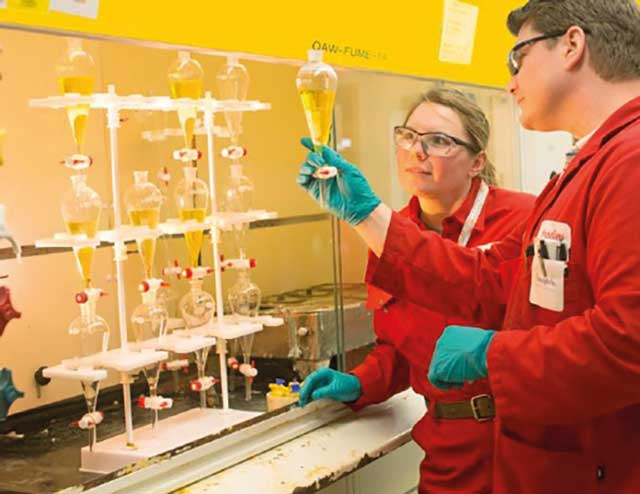 New technology to monitor lubricant health and predict equipment failure can reduce lifetime ownership costs – but many companies are unsure of how to go about it, says Jan-Hendrik Bruns, Shell Lubricants regional technical expert for general manufacturing
New technology to monitor lubricant health and predict equipment failure can reduce lifetime ownership costs – but many companies are unsure of how to go about it, says Jan-Hendrik Bruns, Shell Lubricants regional technical expert for general manufacturing
British manufacturing industry is facing unpredictable times. This uncertainty has led to companies investigating ways of increasing profitability, productivity and efficiency. Coupled with this, evolving technology and changing consumer demands are putting manufacturers under pressure to increase output capacity and minimise downtime, while maintaining product quality.
 The rise of industry 4.0 technologies can help solve the problem of increased equipment downtime and sub-par productivity. Companies can benefit from savings in total cost of ownership (defined as the total spent on industrial equipment: acquisition and operation over its working life, including costs of lost production during equipment downtime) that the rise of the smart, connected factory can bring, which make it possible for manufacturers to take pre-emptive maintenance action.
The rise of industry 4.0 technologies can help solve the problem of increased equipment downtime and sub-par productivity. Companies can benefit from savings in total cost of ownership (defined as the total spent on industrial equipment: acquisition and operation over its working life, including costs of lost production during equipment downtime) that the rise of the smart, connected factory can bring, which make it possible for manufacturers to take pre-emptive maintenance action.
A Shell Lubricants survey[1] found that in the UK, only half (53%) of manufacturers had taken full advantage of new technologies available, potentially due to the lack of understanding and awareness.
Here are three key technologies to be aware of:
Sensor based technologies
Sensor-based technologies can self-test, validate, adapt, identify and understand the environment they are in, while managing a wide range of conditions. 68% of UK manufacturers are opting for real-time, on-site lubrication health monitoring using these technologies, instead of waiting for analysis to take place in laboratories.
This means that lubricants are now replaced or replenished based on their true condition. Sensors provide real-time readings, including friction, wear and tear, and lubricant condition, so manufacturers are now able to plan for predictive maintenance. On detecting contamination or early stage lubricant degradation, sensors can alert maintenance staff of the need to intervene before the problem worsens, thereby helping to avoid costly unplanned breakdowns.
Big data based technologies
With the adoption of sensor technologies comes an increase in data that covers all stages in the life of a product or an asset. If used effectively, big data can allow manufacturers to amass savings in total cost of ownership.
Shell Lubricants has found that in the UK, one in three (31%) manufacturers lack understanding of how to introduce big data-based technologies.
Big data is another way technology can facilitate an active approach to preventive maintenance. Real-time telemetry that details various aspects of the production process allows manufacturing companies to predict with accuracy when machines will fail.
Shell LubeAnalyst, for example, processes and compiles huge quantities of data which can then be used to generate accurate reports that help monitor the oil in stationary or mobile equipment over time.
Cloud-based technologies
The introduction of cloud-based technology into manufacturing means that companies can store large amounts of data in the cloud. Anyone on the supply chain can then have access to the information, in real time, spurring manufacturers to become more agile and efficient, and encouraging them to adapt quickly to changing demands.
By storing information in the cloud, manufacturing companies eliminate worry about the loss of vital information should they face a disaster, such as an industrial fire. After such an event, a shorter period of time would be needed to get the factory running again.
Used correctly, cloud-based technology has enormous potential to help improve manufacturing production and performance. Weaving in big data, companies can glean actionable insights through predictive analytics, such as guaranteeing lubrication quality, and improvements or preventive maintenance, giving them an edge over competitors.
Optimising operations
To help customers navigate upcoming challenges and capitalise on new opportunities, Shell Lubricants is constantly working to create solutions that embrace new technologies to help raise equipment efficiency and uptime, and help to reduce energy consumption and operating expenses.
An example of this solution is the recently-introduced Shell LubeChat, the first artificial intelligence powered chatbot tool for business lubricant customers in the UK. Shell LubeChat is designed to provide users with easy, real-time access to product support, technical services and lubricant data, help improve efficiency and solve common challenges such as quickly finding information about effective equipment lubrication.
For more information and expert advice on optimising maintenance operations, you can download a series of whitepapers at www.shell.co.uk/manufacturing
[1] Edelman Intelligence, commissioned by Shell Lubricants, conducted 100 interviews with senior engineers, operations directors and procurement managers from UK manufacturing companies in December 2016

